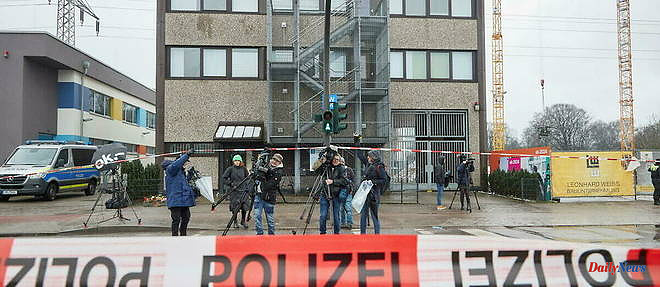Philipp F., 35, is suspected of killing four men and two women with a pistol during a Jehovah's Witnesses prayer session on Thursday, March 9 in Hamburg, before killing himself. The German police are still trying to clarify the motives of the man who once belonged to the organization he attacked. A pregnant woman, injured in the shooting, lost her seven-month-old fetus, which the police counted among the victims to bring their own death toll to eight in total.
"The police came very quickly, maybe 4-5 minutes after the shots were fired," said local resident Anetta, who AFP met while walking her dog. Eight people were injured, four of them seriously. The rapid arrival of the police, who interrupted his act, made it possible to avoid an even heavier toll, according to the authorities. The alleged killer, who probably suffered from mental problems, committed suicide on the spot, shortly after the intervention of the police.
His gesture sparked a debate on the question of the carrying of arms in Germany. In an interview on Friday evening on public television ARD, Federal Minister of the Interior Nancy Faeser spoke out in favor of tougher legislation. In a bill currently in preparation, it is planned to have to present a medical certificate to obtain a license to carry a weapon, she said. On the other hand, it will be more difficult to intervene after the permit has been authorized. Without clues of a possible incapacity, it is "very, very difficult" to intervene, she agreed in this interview.
The man, a sport shooter who owned a legal weapon, fired more than 100 times and still had plenty of ammunition. His motives are yet to be determined, although he did not leave the community "on good terms" a year and a half ago. The testimonies differ on the point of knowing if he was excluded from it or if he left of his own free will. The man, who had no criminal history, "nurtured a rage against members of religious congregations, particularly Jehovah's Witnesses and his previous employer," a police official told a conference Press.
The police had nevertheless received an "anonymous letter" in January stating that the shooter could suffer "from a psychiatric illness, without this having been certified by a doctor, Philipp F. refusing to consult" a specialist. The latter "shot on the participants in a demonstration" of prayer organized Thursday evening by the community in one of its centers in Hamburg, in which about fifty people participated according to Der Spiegel. He forced his way into the three-storey building located on the edge of a major artery, facing a residential complex and a park.
In a statement, Jehovah's Witnesses said they were "shattered". “All of our church services are open to the public. We don't have security guards. Everyone is invited,” said regional community representative Michael Tsifidaris in Hamburg, visibly still shocked by the killings.
Nancy Faeser went to Hamburg at the end of the afternoon and thanked the police and emergency services for their efficiency. "It's hard to find words for this truly terrible act, what the perpetrator has done is horrible," she said. German Chancellor Olaf Scholz had earlier addressed his "thoughts" to the victims and their loved ones, deploring in a tweet "a brutal act of violence".
Founded in the 19th century in the United States, Jehovah's Witnesses consider themselves the heirs of primitive Christianity and constantly and only refer to the Bible.
The status of the organization varies from country to country: they are legally considered the same as the "big" religions in Austria and Germany, which has just over 170,000 members of this denomination. , including 3,800 in Hamburg, according to the Witnesses website. In France, many of their local branches have the status of "cultual association", and this rigorous movement is regularly accused of sectarian aberrations.












